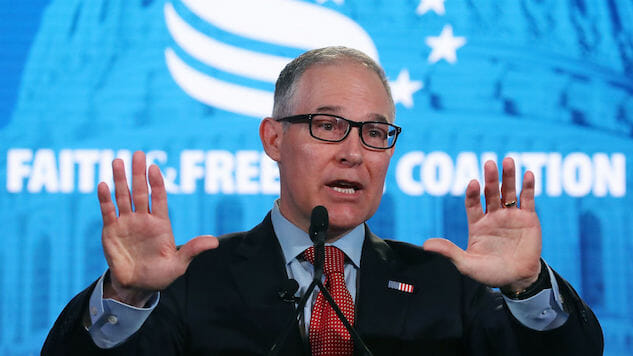The EPA is Protecting Industry Instead of Public Health or the Environment
Photo by Mark Wilson/Getty Politics News EPA
The Environmental Protection Agency is protecting the industries it’s tasked with regulating instead of the environment or public health, The Conversation reports. According a group of social scientists, Scott Pruitt’s “efforts to undo, delay or otherwise block at least 30 existing rules reorient EPA rule-making away from the public interest and toward the interest of the regulated industry.”
Since at least 2008, the EPA has been over-reliant on the industries they are charged with regulating, which ultimately contributed to the financial crisis and the 2010 Deepwater Horizon oil spill. But once Scott Pruitt was hired by the Trump Administration, a group of experts, who recently published a study under the Environmental Data and Governance Initiative, now fear complete “regulatory capture.”
Regulatory capture takes place when agencies become dominated by the industries they were charged with regulating rather than public interest. In May, reporters weren’t allowed into an EPA summit meeting that discussed chemical contamination of drinking water. Experts point to this as a warning sign of a particular industry capturing the EPA. How do they know it’s being captured by industry? According to David Moss and Daniel Carpenter of Harvard, an agency has been captured if its actions have been “directed away from the public interest and toward the interest of the regulated industry” by “intent and action of industries and their allies.”
The mission of the EPA is to “protect human health and the environment.” However, Pruitt has protected the interests of harmful industries such as petrochemicals and coal since his first day at the EPA while rarely speaking to the effects these industries have on the environment and public health. The Conversation notes he has even commented that regulators exist “to give certainty to those that they regulate,” and should be committed to “enhanc(ing) economic growth.”
So what will Pruitt’s actions mean for the environment and public health? For example, when Pruitt refused to ban insecticides last year, he put farm workers and children in danger of developmental delays and autism spectrum disorder. When he revoked the Clean Power Plan and relaxed fuel-efficiency standards, he put the entire nation’s health at risk due to the negative health effects of greenhouse gas emissions. The list goes on, but one fact remains true in each case: regulated industries had an “active hand” in these decisions. Pruitt has met with representatives of the industries he’s tasked with regulating 25 times more often than he’s met with environmental agencies.
Pruitt has direct connections to the industries that are actively controlling the EPA’s regulations. Nancy Beck is the EPA’s deputy assistant administrator of the Office of Chemical Safety and Pollution Prevention, and also happens to be a former executive at the American Chemistry Council. Beck is just one in a long list of EPA senior officials who have ties to the industries they are now tasked with regulating. Other notable examples are Deputy Administrator Andrew Wheeler—a former coal industry lobbyist—and Senior Deputy General Counsel Erik Baptist, a former senior counsel at the American Petroleum Institute.
These ties reveal corporate lobbyists are directly impacting the EPA’s decisions. For example, the decision to overturn the Clean Power Plan as well as the decision to withdraw from the Paris climate accord were moves recommended by coal magnate Robert Murray in his Action Plan for the Administration. Emails between Pruitt and Murray have been documented, as well as Pruitt’s visits with multiple corporate officials as they worked together to take down the Clean Power Plan.
Not only is Pruitt working directly with industries and their corporate lobbyists, he is also silencing those in the EPA who disagree with these actions. According to The Conversation, EPA employees have been “threatened by budget cuts, buyouts and retribution against disloyal staff and leakers.” Pruitt has even limited the scientific research that the agency can rely on when they write environmental regulations. However, the EPA Science Advisory Board voted to do a review of Pruitt’s controversial, and corrupt, proposals—including the scientific justifications behind them. Despite these efforts, the current administration will stand behind Pruitt and every cooperation he is representing. Our only hope for the protection of the environment and public health is the midterm elections and the 2020 presidential election.